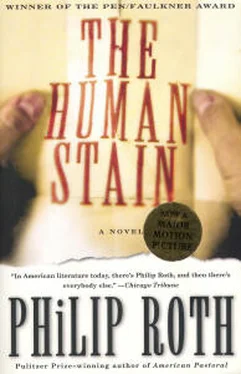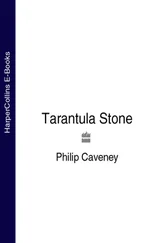Among those pleasured creatures and the aura they exuded of an opulent, earthy oneness with female abundance, it was Faunia who labored like the beast of burden for all that she seemed, with the cows framing her figure, one of evolution's more pathetic flyweights. Calling them to come out from the open shed where they were reposefully sprawled in a mix of hay and shit—“Let's go, Daisy, don't give me a hard time. C'mon now, Maggie, that's a good girl. Move your ass, Flossie, you old bitch”—grabbing them by the collar and driving and cajoling them through the sludge of the yard and up one step onto the concrete floor of the milking parlor, shoving these cumbersome Daisys and Maggies in toward the trough until they were secure in the stanchion, measuring out and pouring them each their portion of vitamins and feed, disinfecting the teats and wiping them clean and starting the milk flow with a few jerks of the hand, then attaching to the sterilized teats the suction cups at the end of the milk claw, she was in motion constantly, fixed unwaveringly on each stage of the milking but, in exaggerated contrast to their stubborn docility, moving all the time with a beelike adroitness until the milk was streaming through the clear milk tube into the shining stainless-steel pail, and she at last stood quietly by, watching to make certain that everything was working and that the cow too was standing quietly. Then she was again in motion, massaging the udder to be sure the cow was milked out, removing the teat cups, pouring out the feed portion for the cow she would be milking after undoing the milked cow from the stanchion, getting the grain for the next cow in front of the alternate stanchion, and then, within the confines of that smallish space, grabbing the milked cow by the collar again and maneuvering her great bulk around, backing her up with a push, shoving her with a shoulder, bossily telling her, “Get out, get on out of here, just get—” and leading her back through the mud to the shed.
Faunia Farley: thin-legged, thin-wristed, thin-armed, with clearly discernible ribs and shoulder blades that protruded, and yet when she tensed you saw that her limbs were hard; when she reached or stretched for something you saw that her breasts were surprisingly substantial; and when, because of the flies and the gnats buzzing the herd on this close summer day, she slapped at her neck or her backside, you saw something of how frisky she could be, despite the otherwise straight-up style. You saw that her body was something more than efficiently lean and severe, that she was a firmly made woman precipitously poised at the moment when she is no longer ripening but not yet deteriorating, a woman in the prime of her prime, whose fistful of white hairs is fundamentally beguiling just because the sharp Yankee contour of her cheeks and her jaw and the long unmistakably female neck haven't yet been subject to the transformations of aging.
“This is my neighbor,” Coleman said to her when she took a moment to wipe the sweat from her face with the crook of her elbow and to look our way. “This is Nathan.”
I hadn't expected composure. I was expecting someone openly angrier. She acknowledged me with no more than a jerk of her chin, but it was a gesture from which she got a lot of mileage. It was a chin from which she got a lot of mileage. Keeping it up as she normally did, it gave her — virility. That was in the response too: something virile and implacable, as well as a little disreputable, in that dead-on look. The look of someone for whom both sex and betrayal are as basic as bread. The look of the runaway and the look that results from the galling monotony of bad luck. Her hair, the golden blond hair in the poignant first stage of its unpreventable permutation, was twisted at the back through an elastic band, but a lock kept falling toward her eyebrow as she worked, and now, while silently looking our way, she pushed it back with her hand, and for the first time I noticed in her face a small feature that, perhaps wrongly, because I was searching for a sign, had the effect of something telling: the convex fullness of the narrow arch of flesh between the ridge of eyebrow and the upper eyelids. She was a thin-lipped woman with a straight nose and clear blue eyes and good teeth and a prominent jaw, and that puff of flesh just beneath her eyebrows was her only exotic marking, the only emblem of allure, something swollen with desire. It also accounted for a lot that was unsettlingly obscure about the hard flatness of her gaze.
In all, Faunia was not the enticing siren who takes your breath away but a clean-cut-looking woman about whom one thinks, As a child she must have been very beautiful. Which she was: according to Coleman, a golden, beautiful child with a rich stepfather who wouldn't leave her alone and a spoiled mother who wouldn't protect her.
We stood there watching while she milked each of the eleven cows — Daisy, Maggie, Flossie, Bessy, Dolly, Maiden, Sweetheart, Stupid, Emma, Friendly, and Jill — stood there while she went through the same unvarying routine with every one of them, and when that was finished and she moved into the whitewashed room with the big sinks and the hoses and the sterilizing units adjacent to the milking parlor, we watched her through that doorway mixing up the lye solution and the cleansing agents and, after separating the vacuum line from the pipeline and the teat cups from the claw and the two milker pails from their covers — after disassembling the whole of the milking unit that she'd taken in there with her — setting to work with a variety of brushes and with sinkful after sinkful of clear water to scrub every surface of every tube, valve, gasket, plug, plate, liner, cap, disc, and piston until each was spotlessly clean and sanitized. Before Coleman took his milk and we got back into his car to leave, he and I had stood together by the refrigerator for close to an hour and a half and, aside from the words he uttered to introduce me to her, nobody human said anything more. All you could hear was the whirring and the chirping of the barn swallows who nested there as they whished through the rafters where the barn opened out behind us, and the pellets dropping into the cement trough when she shook out the feed pail, and the shuffling clump of the barely lifted hooves on the milking parlor floor as Faunia, shoving and dragging and steering the cows, positioned them into the stanchion, and then the suction noise, the soft deep breathing of the milk pump.
After they were each buried four months later, I would remember that milking session as though it were a theatrical performance in which I had played the part of a walk-on, an extra, which indeed I now am. Night after night, I could not sleep because I couldn't stop being up there on the stage with the two leading actors and the chorus of cows, observing this scene, flawlessly performed by the entire ensemble, of an enamored old man watching at work the cleaning woman-farmhand who is secretly his paramour: a scene of pathos and hypnosis and sexual subjugation in which everything the woman does with those cows, the way she handles them, touches them, services them, talks to them, his greedy fascination appropriates; a scene in which a man taken over by a force so long suppressed in him that it had all but been extinguished revealed, before my eyes, the resurgence of its stupefying power. It was something, I suppose, like watching Aschenbach feverishly watching Tadzio — his sexual longing brought to a boil by the anguishing fact of mortality — except that we weren't in a luxury hotel on the Venice Lido nor were we characters in a novel written in German or even, back then, in one written in English: it was high summer and we were in a barn in the Northeast of our country, in America in the year of America's presidential impeachment, and, as yet, we were no more novelistic than the animals were mythological or stuffed. The light and heat of the day ( that blessing), the unchanging quiet of each cow's life as it paralleled that of all the others, the enamored old man studying the suppleness of the efficient, energetic woman, the adulation rising in him, his looking as though nothing more stirring had ever before happened to him, and, too, my own willing waiting, my own fascination with their extensive disparity as human types, with the nonuniformity, the variability, the teeming irregularity of sexual arrangements — and with the injunction upon us, human and bovine, the highly differentiated and the all but undifferentiated, to live, not merely to endure but to live, to go on taking, giving, feeding, milking, acknowledging wholeheartedly, as the enigma that it is, the pointless meaningfulness of living — all was recorded as real by tens of thousands of minute impressions. The sensory fullness, the copiousness, the abundant — superabundant — detail of life, which is the rhapsody. And Coleman and Faunia, who are now dead, deep in the flow of the unexpected, day by day, minute by minute, themselves details in that superabundance.
Читать дальше












